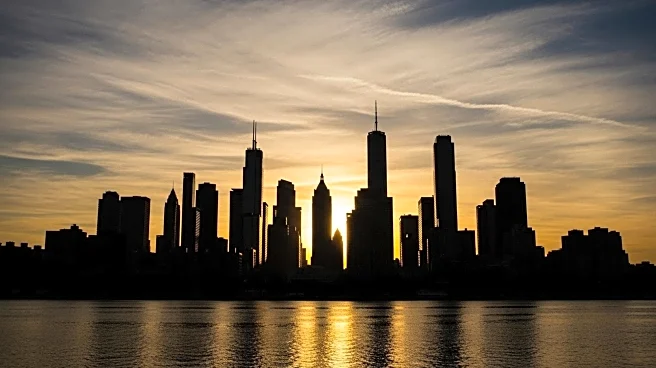What's Happening?
Chicago Mayor Brandon Johnson has publicly opposed President Trump's plan to deploy the National Guard to Chicago, signing an executive order to resist what he describes as 'tyranny.' The order specifies that Chicago police will not assist the National Guard in immigration enforcement or related activities. Johnson emphasized the distinction between local law enforcement and federal agents, stating that the city's police department will not be deputized by the federal government. Illinois Governor JB Pritzker has also expressed concern, labeling the potential deployment as an 'invasion' and noting that no communication has occurred between the administration and state officials. Despite a decrease in violent crime rates in Chicago, President Trump has indicated that federal intervention may be necessary, citing similar actions in other cities with Democratic leadership.
Why It's Important?
The opposition from Chicago's mayor and Illinois' governor highlights tensions between local and federal authorities regarding law enforcement and immigration policies. The deployment of federal troops in major cities raises concerns about the balance of power and the autonomy of local governments. Critics argue that such actions could undermine democratic principles and lead to increased federal control over local jurisdictions. The situation in Chicago is part of a broader pattern of federal interventions in cities with Democratic leadership, which could have significant implications for public policy and civil liberties.
What's Next?
As the situation develops, Chicago residents and local officials are preparing for potential federal troop deployments after Labor Day. The executive order signed by Mayor Johnson aims to ensure that city agencies are aware of their responsibilities in protecting residents' rights. Governor Pritzker has urged protesters to avoid confrontations with federal troops, while President Trump continues to assert the necessity of federal intervention. The unfolding events may prompt further legal and political challenges, as local leaders seek to maintain control over their jurisdictions.
Beyond the Headlines
The deployment of federal troops in cities like Chicago could have long-term implications for the relationship between local and federal governments. It raises questions about the role of federal authority in local law enforcement and the potential for increased militarization of domestic policing. The situation also reflects broader political divides in the U.S., with cities led by Democratic officials facing federal actions from a Republican administration. This dynamic may influence future policy debates and electoral outcomes.










